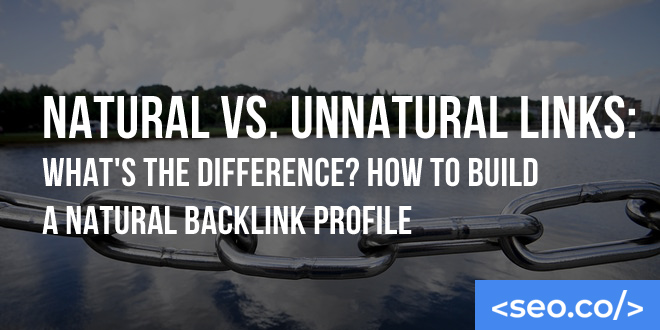
Natural Backlinks vs. Unnatural Backlinks: How to Build a Natural Link Profile
Natural quality backlinks are a major factor in calculating a domain’s overall authority, which in turn influences its rankings for various keywords. Semantic search–including artificial intelligence (AI), machine learning (ML) and natural language processing–help to determine whether a link was acquired naturally or unnaturally. Unnatural backlinks earn penalties from Google (both manual and algorithmic) and harm domain authority and trust. While natural backlinks help you grow your rankings and overall web traffic. To get around this, many search marketers simply adjusted their link building tactics to make their links appear to be more natural, rather than relying on the proper cultivation of purely natural links. Let’s dig in! Natural Backlinks vs. Unnatural Backlinks Google’s ability to detect natural links is more advanced than ever, and with some Google employees insisting that link building for SEO should be avoided altogether, it pays to know the real differences between unnatural and natural links and why you should be working to build backlinks naturally. It’s only one of the reasons we encourage all of our clients to perform a backlink audit as part of our holistic and regular SEO audit services. When comparing your backlink profile, we’ll be discussing a number of critical components to ensure your links are natural. In doing so, you will be better able to find the “website equivalent” of the following: The Strict Definition of a Natural Backlink In the truest sense of the definition, and the one Google uses as the basis for its algorithm development, natural links are ones that you had no part in creating. Some neutral third party decided that your domain was worth linking to, so they posted a link somewhere to prove a point or offer a resource. Unnatural links, on the other hand, are any links that you put into place yourself. That means even your most carefully-placed, intelligently created, authoritatively sourced links are considered unnatural if you placed them with the intention of increasing your rank. That being said, Google still isn’t all-knowing (though it gets a little closer every day). Its algorithm can only use certain indicators to judge whether or not a link is natural, and as long as your link passes those tests, you won’t be penalized. Learning these indicators can help you understand what types of links are considered natural, and how to structure your own links so they appear to be natural in Google’s eyes throughout the course of your link building campaign. Types of Backlink Sources First, Google takes a look at the type of source being used to host the link. If the link is pointing to a domain in an industry wholly unrelated to that of the source, it will be considered unnatural. As a result, keeping your links to only the most relevant sources of your industry or business is a wise strategy. On a related note, higher authority sources tend to pass more authority than lower authority sources, so getting a link featured on a major publisher or .edu site is much more natural and much more powerful than stuffing one into an article directory. Natural Anchor Text There was a time when anchoring your links with keywords or words related to your industry was a good idea. That time has passed. If Google notices too many of your links using the same keyword or keyword phrase, it will become wise to your tactics and judge your links to be unnatural. Instead, try to anchor your links with words that actually describe what your page has to offer, or better yet, let your link sit naturally in a bed of text. We recommend tools like SEOJet for helping to gauge proper anchor text variability among differing pages of your website. For instance, the anchor text variation for your homepage will look much different than the anchor text variation of internal service pages and blog posts: mepage should look much different than your services pages and your blog posts: versus Source Diversity Google also looks for patterns in how and where you’re posting links. Essentially, it can tell if a particular series of links have been placed by the hands of a single individual or company. For example, if all your links are confined to only two or three different sources, Google will conclude that you’re either spamming the links or you’ve engaged in some kind of mutual link scheme with those other sources. Either way, your links will appear unnatural—so make sure you’re using a wide variety of different sources. One of the main methods for tracking link diversity is by using third-party link building tools like Moz or Ahrefs. For instance, take a look at the Domain Authority (DA) diversity of a client who came to us wanting to build more backlinks from high authority websites: Contrast this with a popular industry SEO blog: Granted, the data is a bit skewed as our client had not yet reached scale. As the scale of one’s sitelinks expands, the backlink profile should begin to appear and more “natural.” But link builders need to be aware of where they are procuring their links and at what scale. Link Destination If all the links pointing back to your domain point to the same page, Google will deem them to be unnatural. For example, if you use your homepage as your primary URL when posting external links, eventually Google will pick up on your habits and penalize you. Instead, use a variety of different link destinations, getting to the deepest pages of your site whenever possible. Link Context The contextual placement of your link also matters. For example, if you post a link by itself with no explanation as the only comment on an external blog, your link will definitely appear unnatural. If, however, you introduce your link with a thoughtful explanation of why it’s helpful in response to another member’s comment, your link will appear to be natural—even more, it will be natural. Work to frame your links in a real, natural context







